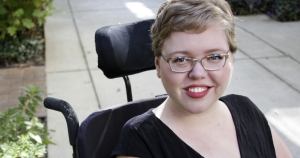Define Me … If You Dare!
I have to accumulate all the data from these varying experiences and use them to define myself. Otherwise, others will do it for me.
I have to accumulate all the data from these varying experiences and use them to define myself. Otherwise, others will do it for me.

ADD isn’t an end of the world big deal. It’s really, really not. But it is a deal, it’s a thing. It’s a disability. It puts you on a different default setting.

These magical or futuristic “fixes” seem rooted in a discomfort with disability: many writers cannot (or don’t want to) imagine a life without sight and therefore create excuses to give their character equivalent sighted experiences.

A snarky New York Times column referred to CFS as “yuppie flu,” and oh, it was hilarious. Those silly rich people imagining themselves sick!

Autistic people learn, change, and cope like anyone else. However, when a character is autistic, many authors appear to see only one route for character growth: effectively making the character less autistic.

As much as I crave representation in fiction, it bothers me that some people seem to see autism as a way to create conflict or add a unique viewpoint to a narrative. It is even more disturbing when so many of these portrayals are inaccurate or incomplete.

A lot of people only see the bad sides of Asperger’s. What they don’t see is that it can have its perks, too. My entire career as an author—which is a very fun one!—is entirely dependent on this condition.

An estimated 1 in 7 women suffer from chronic pelvic pain; it’s bizarre and disappointing that despite these statistics, there are distinctly zero characters with this condition.

I’ve talked a lot about the ways my disability has affected my body image, my sexuality, my confidence, and my social interactions, and all of those things are important to consider when writing a disabled character. Today, however, I want to focus on the ways my disability affects the logistics of my life.

When privileged outsiders define us, they often do so out of ignorance, self-interest, or malice, and their versions of ourselves, rather than our own realities, become the norm.